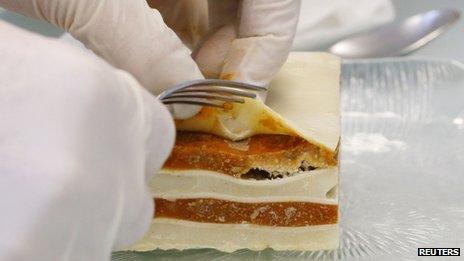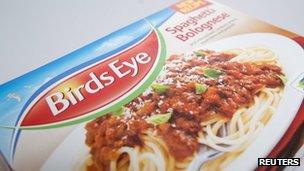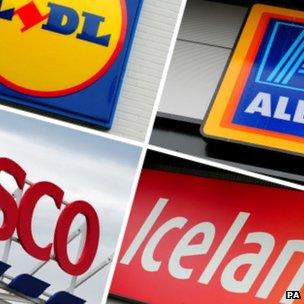Horsemeat scandal: How horse meat has kept ready-meal prices low
- Published

Tests carried out found that hardly any processed minced beef products contained horse DNA
Rising beef prices and a public preference for cheap food were contributory factors leading to the horsemeat scandal, food industry experts say.
Beef and veal prices have risen by more than 45% across Europe over the past five years, according to the European Commission, while the global auction price for beef has topped $5,300 (£3,500) a tonne.
Horsemeat, by contrast, currently costs about $1,200 a tonne.
"It is clear that rising beef prices and the relative cheapness of horsemeat have led some people to see the potential for making big profits through fraud," says Peter Hardwick, head of trade development at Eblex, the English beef and sheep industry body.
Mr Hardwick believes the financial pressure on meat producers, who operate at profit margins of 5% and below compared with double-digit margins for retailers, may have also contributed to the problem.
"There isn't cheap beef to be found anywhere," he says. "But we still believe that ready meals can be made as cheaply as they always have been."
Cheaper food

Sales of chilled ready meals have been growing by nearly 10% a year
Despite soaring beef prices, ready meals containing beef mince have not risen in price accordingly, even though the meat is their most expensive ingredient.
For example, the average chilled ready meal costs £2.31, up just 4% over the past three years, roughly in line with food inflation, according to research from retail analyst Kantar Worldpanel.
Meanwhile, our love affair with the ready meal continues apace. Almost nine out of 10 UK households now buy them, despite a study published in the British Medical Journal, external in December finding that not one of 100 meals tested fully complied with World Health Organisation nutritional guidelines.
The cheapness and convenience of chilled ready meals in particular has led to sales growing almost 10% per year over the past three years, with spending rising from £2.1bn to £2.5bn.
Frozen meals are a bit less popular, but spending on these has also risen, from £655m to £710m over the same period.
To put this into context, we now spend £74bn a year on food, yet spending on food and non-alcoholic drinks as a proportion of household expenditure has fallen dramatically from 24% in 1963 to just 9% in 2012, according to the Office for National Statistics.
How can we explain this apparent paradox?
"Food is cheaper in real terms than it has ever been," says Richard Dodd, spokesman for the British Retail Consortium (BRC). "But it has become so affordable because we've become much more efficient in agriculture, production and and retailing.
"Yes, we spend much less of our disposable income on food these days, but this is related to rising incomes and the increased affordability of food."
Intense supermarket competition has educated the British shopper to expect cheap food, says Richard Stevenson, technical manager of the National Federation of Meat and Food Traders, the body representing most High Street butchers.
More than 90% of British consumers still consider price an important factor when shopping for food, according to Kantar Worldpanel, compared with 73% who take health into consideration.
Just 32% of shoppers consider whether the product has been sourced through fair trade and only 22% care whether or not it is organic.
DNA tests

Many supermarkets have withdrawn burgers and beef mince ready meals as a result of the scandal
Tesco, Asda, Co-op, Morrisons, Lidl, Iceland and Aldi have all withdrawn burgers and beef mince ready meals as a result of the scandal. Manufacturers such as Findus and Birds Eye have taken similar steps.
Yet, the Food Standards Agency says more than 99% of 3,634 tests carried on processed minced beef products contained no horse DNA at or above the 1% level. The 13 products that did have already been withdrawn from sale.
The BRC says that its member retailers have completed more than 90% of their tests, and that out of 1,500 completed since 20 January, only six proved positive.
"I'm encouraged by these updated results which confirm how few products have been involved and that any that were have already been removed," says BRC director general Helen Dickinson.
New DNA testing regimes notwithstanding, the intense financial pressure on the meat and food processing industries is expected to only increase while shoppers continue to expect cheap, convenient processed foods made from raw ingredients whose prices continue to rise in the global marketplace.
- Published13 February 2013
- Published22 February 2013
- Published15 February 2013
- Published15 February 2013
- Published27 February 2013